
Journal of Cardiovascular Translational Research
Scope & Guideline
Pioneering Advances in Cardiovascular Medicine and Genetics
Introduction
Aims and Scopes
- Translational Research in Cardiovascular Medicine:
The journal prioritizes studies that translate laboratory findings into clinical practice, enhancing understanding of cardiovascular pathophysiology and treatment. - Innovative Therapeutic Strategies:
Research on novel therapeutic approaches, including pharmacological interventions, surgical techniques, and device development, is a core focus. - Biomarkers and Diagnostics:
The journal explores the identification and validation of biomarkers for cardiovascular diseases, facilitating early diagnosis and personalized treatment. - Advanced Imaging and Computational Modeling:
Papers utilizing advanced imaging techniques and computational modeling to study cardiovascular function and disease progression are frequently published. - Pathophysiology of Cardiovascular Diseases:
The journal covers research on the underlying mechanisms of cardiovascular diseases, including genetic, metabolic, and inflammatory pathways. - Patient-Centric Studies:
Clinical trials and studies that assess patient outcomes, quality of life, and healthcare delivery related to cardiovascular conditions are emphasized.
Trending and Emerging
- Extracellular Vesicles and Non-Coding RNAs:
Research on the role of extracellular vesicles and non-coding RNAs in cardiovascular diseases is gaining traction, highlighting their potential as biomarkers and therapeutic targets. - Machine Learning and Artificial Intelligence Applications:
The integration of machine learning and AI in analyzing cardiovascular data is a rapidly growing area, facilitating improved diagnostic accuracy and patient management. - Metabolic Reprogramming and Cardiovascular Health:
Studies exploring metabolic pathways and their impact on cardiovascular diseases are increasingly relevant, linking metabolism with heart function and disease progression. - Personalized Medicine and Genomics:
There is a growing emphasis on personalized medicine approaches, utilizing genomic information to tailor treatments for individuals with cardiovascular diseases. - Immunomodulation in Cardiovascular Therapy:
Research focusing on the role of the immune system in cardiovascular health and disease is emerging, including studies on immunotherapies and inflammatory pathways. - Digital Health Technologies:
The application of digital health technologies, including telemedicine and wearable devices, is gaining prominence, reflecting the shift towards more patient-centered care.
Declining or Waning
- Traditional Pharmacological Approaches:
There appears to be a decline in studies focused solely on traditional pharmacological treatments, as the field shifts towards more integrated and innovative therapeutic strategies. - Basic Animal Model Studies without Translational Relevance:
Research that does not bridge basic science with clinical implications is becoming less common, with a preference for studies that demonstrate direct translational potential. - Epidemiological Studies with Limited Clinical Application:
While epidemiological research remains important, studies that do not connect findings to actionable clinical insights or therapeutic developments are less frequently published. - Isolated Mechanistic Studies:
There is a noticeable reduction in the publication of studies that focus exclusively on isolated mechanisms without a broader translational application to cardiovascular health or disease.
Similar Journals

HEART AND VESSELS
Advancing Cardiovascular Insights for a Healthier TomorrowHEART AND VESSELS is a prominent peer-reviewed journal published by SPRINGER, dedicated to advancing the fields of cardiology and cardiovascular medicine. With its ISSN 0910-8327 and E-ISSN 1615-2573, this esteemed journal encompasses a broad range of topics pertinent to heart health, vascular function, and associated therapies, making it an essential resource for researchers, clinicians, and healthcare professionals alike. Based in Japan and operating since 1985, HEART AND VESSELS has consistently maintained a Q2 ranking in the 2023 category quartiles, highlighting its relevance and impact in the cardio domain. Although it does not offer open access, the journal ensures high-quality publications that contribute significantly to the academic and clinical understanding of cardiovascular health. With over three decades of continuous scholarly contribution, HEART AND VESSELS serves as a vital platform for disseminating cutting-edge research and fostering innovative practices in the management of cardiovascular diseases.
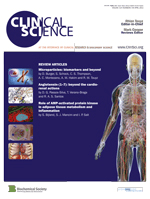
CLINICAL SCIENCE
Fostering Collaboration in Clinical Research ExcellenceCLINICAL SCIENCE, published by PORTLAND PRESS LTD, is a prestigious journal with an established history that dates back to 1946. Renowned for its rigorous peer-reviewed articles, the journal is dedicated to advancing knowledge in the field of medicine, particularly in the nuances of clinical science and translational research. With an impressive Q1 ranking in the **Medicine (miscellaneous)** category and a Scopus rank of #32 out of 636 in general medicine, it is firmly positioned in the top 5% percentile of its field, making it an essential resource for researchers, practitioners, and students aiming to stay at the forefront of the discipline. Although the journal operates on a traditional subscription model, its influence and accessibility ensure that critical findings and innovative methodologies reach a wide audience, fostering collaboration and progress within the global medical community. The journal seeks to publish groundbreaking studies, critical reviews, and insights that can translate into improved clinical practices, thus reinforcing its mission to enhance patient care and medical knowledge.
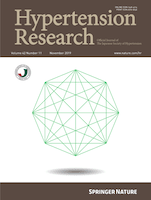
HYPERTENSION RESEARCH
Transforming hypertension research into clinical practice.HYPERTENSION RESEARCH, published by SpringerNature, serves as a premier platform in the field of Cardiology and Cardiovascular Medicine, Internal Medicine, and Physiology. Since its inception in 1992, the journal has built a substantial reputation, currently ranked in the second quartile (Q2) across several categories in 2023, reflecting its influence and high-quality contributions to medical research. With a focus on hypertension, the journal aims to disseminate vital research findings, clinical studies, and innovative treatment strategies to a diverse audience of researchers, healthcare professionals, and students, fostering knowledge exchange in the management of hypertensive conditions. Although it is not an Open Access journal, it offers comprehensive access to its extensive archive of valuable resources, ensuring that critical advancements in the understanding of hypertension are both accessible and impactful. HYPERTENSION RESEARCH is not only essential for those directly involved in cardiovascular and internal medicine practices but also for interdisciplinary scholars who are looking to explore the intersections of physiology and other biomedical fields in their work.
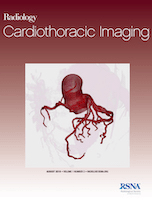
Radiology-Cardiothoracic Imaging
Advancing the Frontiers of Cardiothoracic ImagingRadiology-Cardiothoracic Imaging, published by the Radiological Society of North America (RSNA), is a leading peer-reviewed journal dedicated to advancing knowledge in the field of cardiothoracic radiology. With an ISSN of 2638-6135 and a remarkable 2023 Scopus ranking of #5 out of 333 in its category, the journal stands out in the Q1 tier for Radiology, Nuclear Medicine, and Imaging, showcasing its significant impact and high-quality research contributions. The journal is committed to providing an open platform for innovative research, insightful reviews, and clinical studies that address the complexities of cardiothoracic imaging, thereby facilitating the enhancement of diagnostic and therapeutic strategies. Operating out of Oak Brook, Illinois, the journal aims to engage a diverse audience of researchers, professionals, and students, fostering collaboration and knowledge exchange within this vital area of radiological science. With a convergence of years extending from 2019 to 2024, Radiology-Cardiothoracic Imaging remains at the forefront of emerging trends and findings, making it an essential resource for anyone passionate about the evolving landscape of cardiothoracic imaging.
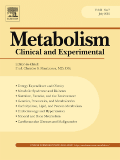
METABOLISM-CLINICAL AND EXPERIMENTAL
Transforming Understanding of Metabolic DisordersMETABOLISM-CLINICAL AND EXPERIMENTAL is a premier academic journal published by W B SAUNDERS CO-ELSEVIER INC, with a distinguished history dating back to 1952. This journal serves as a vital repository of knowledge in the fields of Endocrinology, Diabetes, and Metabolism, consistently ranking in the top quartile (Q1) within these categories according to the latest metrics. With an impressive impact factor and recognized for its contributions to Biochemistry, Genetics, and Molecular Biology, it ranks #5 out of 128 in the Scopus database for Endocrinology and #11 out of 244 for Medicine related to Endocrinology, Diabetes, and Metabolism, placing it in the 95th and 96th percentiles, respectively. While the journal does not currently offer open access, it maintains rigorous peer review standards and publishes cutting-edge research that drives forward the understanding of metabolic diseases and clinical practices. By engaging with METABOLISM-CLINICAL AND EXPERIMENTAL, researchers, healthcare professionals, and students can explore groundbreaking advancements and pivotal findings that shape the future of metabolic health.

International Cardiovascular Research Journal
Innovating heart health through rigorous research.International Cardiovascular Research Journal, published by Shiraz University Medical Sciences, serves as a vital platform for the dissemination of cutting-edge research in the field of cardiology and cardiovascular medicine. Since its inception in 2011, this journal has continuously devoted itself to promoting the highest quality of scholarly communication, helping to bridge the gap between laboratory findings and clinical application. With an ISSN of 2251-9130 and an E-ISSN of 2251-9149, it is indexed in prominent databases, contributing to its visibility and accessibility to a global audience. Although currently classified in the Q4 quartile in the 2023 rankings, the journal is committed to enhancing its impact factor and academic stature. It aims to facilitate open access for all published articles, although specific details on access options are pending. Through its rigorous peer-review process and diverse scope—which encapsulates advancements, clinical studies, and innovative therapeutic strategies—this journal fosters academic collaboration in the realm of cardiovascular health, making it an invaluable resource for researchers, practitioners, and students alike.
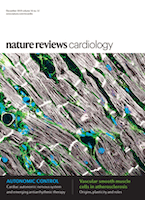
Nature Reviews Cardiology
Navigating the Complexities of Cardiovascular Health TogetherNature Reviews Cardiology, published by NATURE PORTFOLIO, stands as a premier academic journal in the field of cardiology and cardiovascular medicine, boasting an impressive impact factor and a distinguished ranking of #1 out of 387 in Scopus. Since its inception in 2009, this exemplary journal has continuously delivered cutting-edge reviews and insights, supporting researchers, healthcare professionals, and students in navigating the complex landscape of cardiovascular health. With a commitment to providing open access and disseminating rigorous research, Nature Reviews Cardiology captures the forefront of innovation and scholarship, critical for facilitating advancements in cardiovascular science and clinical practice. Situated in the United Kingdom and with a vibrant global readership, this journal perpetuates academic excellence, ensuring accessibility to the latest findings that shape prevention, diagnosis, and treatment strategies in cardiology through to 2024 and beyond.

Nature Cardiovascular Research
Pioneering insights into the heart of cardiovascular science.Nature Cardiovascular Research, published by SpringerNature in Germany, stands as a premier journal dedicated to advancing the field of cardiovascular sciences. With an impressive 2023 categorization in the Q1 quartile across multiple disciplines—including Biochemistry, Genetics and Molecular Biology, Cardiology, and Medicine—this journal uniquely positions itself as a leading resource for pioneering research and innovative findings. Although currently not open access, it provides a rich repository of peer-reviewed articles that contribute directly to the evolving landscape of cardiovascular medicine. The journal aims to bridge the knowledge gap between basic science and clinical application, catering to researchers, healthcare professionals, and students alike who are immersed in the complexities of cardiovascular health. With robust Scopus rankings in key categories, Nature Cardiovascular Research is poised to shape future directions in the field, helping to foster a deeper understanding of cardiovascular diseases and their underlying mechanisms. Explore the latest research and be part of the conversation in one of the most impactful scientific domains.
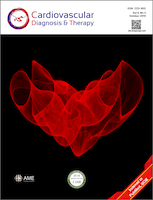
Cardiovascular Diagnosis and Therapy
Empowering Practitioners with Essential Cardiovascular KnowledgeCardiovascular Diagnosis and Therapy, an esteemed journal in the field of Cardiology and Cardiovascular Medicine, is published by AME PUBLISHING COMPANY, based in Hong Kong, China. With an ISSN of 2223-3652 and an E-ISSN of 2223-3660, this open-access journal aims to present cutting-edge research that significantly advances diagnostic and therapeutic practices in cardiovascular health. Recognized for its impact, it holds a 2023 category quartile ranking of Q2 and is positioned at rank #124 out of 387 in Scopus, reflecting its noteworthy contribution to medical literature with a percentile of 68th. The journal welcomes contributions that span various aspects of cardiovascular research, including clinical trials, epidemiological studies, and innovative therapeutic approaches, making it a vital resource for researchers, practitioners, and students alike, committed to improving cardiovascular care.

JOURNAL OF CLINICAL INVESTIGATION
Uncovering the science behind clinical excellence.JOURNAL OF CLINICAL INVESTIGATION is a premier scholarly journal published by the American Society for Clinical Investigation, dedicated to advancing the field of clinical research and medicine since its inception in 1945. With an impressive impact factor and ranked Q1 in the field of Medicine (miscellaneous), it stands out as a leading source of high-quality research, reflecting its exceptional position in Scopus ranking as #13 out of 636 in General Medicine, placing it in the 98th percentile. The journal focuses on groundbreaking studies that explore the underlying mechanisms of human disease, facilitating a deeper understanding that drives clinical practice and innovation. Although it is not an open-access journal, the insights and findings published in this esteemed journal are essential reading for researchers, healthcare professionals, and students aspiring to contribute to the dynamic landscape of clinical investigation. Published in the United States, it continues to shape the dialogue and advancement within the medical community through its rigorous peer-review process and commitment to excellence.